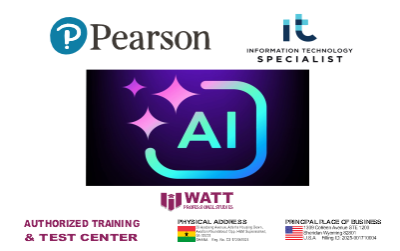AI ITS PEARSON CERTIFICATION

GH₵2500
GH₵5000
Candidates for this certification have a foundational knowledge the procedures used to develop an artificial intelligence (AI) solution, as well as an understanding of the issues surrounding the governance, transparency, security, and ethics of AI. Successful candidates will be able to analyze and classify a problem. They should be able to demonstrate knowledge of data collection, data processing, and feature engineering strategies. Candidates should be able to choose an appropriate algorithm for training a model, and understand the metrics used to evaluate model performance. They should understand the AI development lifecycle and how a production pipeline is used to allow for continuous improvement. Candidates at least 150 hours of instruction and/or exploration of artificial intelligence methodology and solutions
Learn more
 1
1 